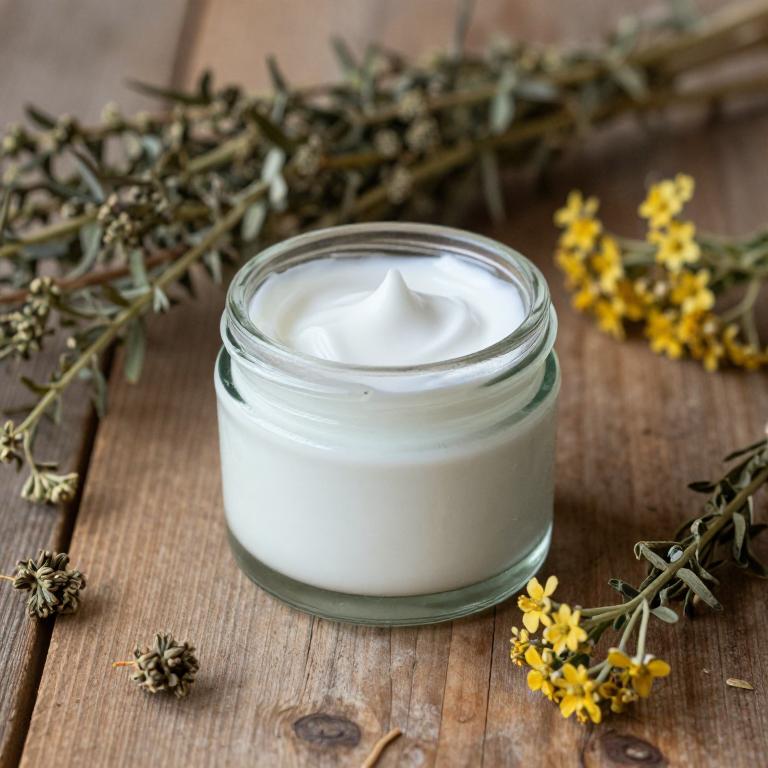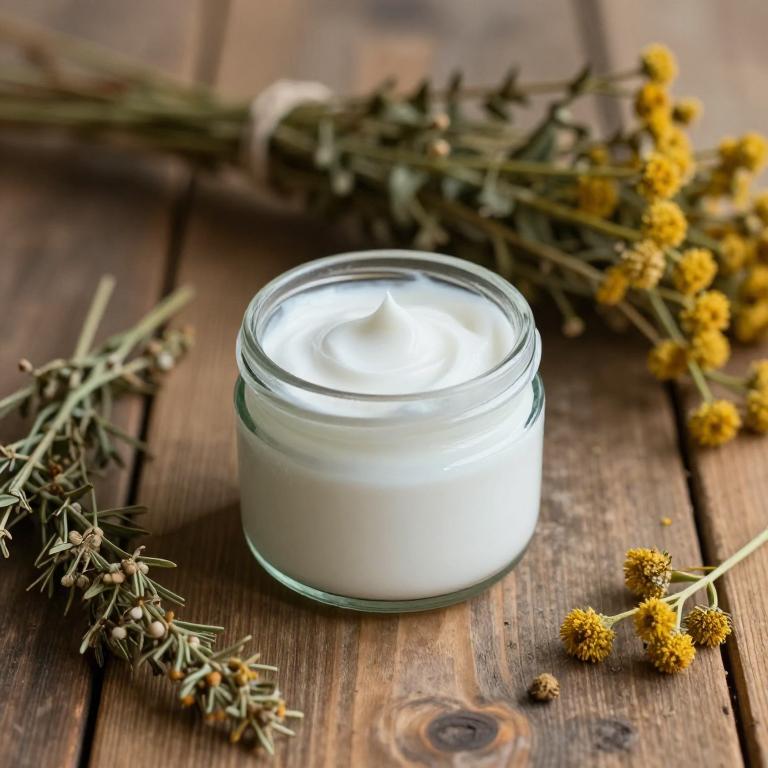10 Best Herbal Creams For Oral Thrush

Herbal creams for oral thrush are natural remedies that may help alleviate symptoms caused by a fungal infection in the mouth.
These creams often contain ingredients like tea tree oil, calendula, and chamomile, which are known for their antifungal and anti-inflammatory properties. While they can provide soothing relief, they are generally considered complementary rather than a primary treatment for oral thrush. It is important to consult a healthcare provider before using herbal creams, especially if symptoms persist or worsen.
These products may not be suitable for everyone, particularly those with allergies or sensitive skin.
Table of Contents
- 1. Echinacea (Echinacea purpurea)
- 2. Aloe vera (Aloe barbadensis)
- 3. Ginger (Zingiber officinale)
- 4. Stinging nettle (Urtica dioica)
- 5. Salvia (Salvia officinalis)
- 6. Rosemary (Rosmarinus officinalis)
- 7. St. john's wort (Hypericum perforatum)
- 8. Licorice (Glycyrrhiza glabra)
- 9. Thyme (Thymus vulgaris)
- 10. Lemon balm (Melissa officinalis)
1. Echinacea (Echinacea purpurea)

Echinacea purpurea, commonly known as purple coneflower, is often used in herbal remedies for its potential antimicrobial and immune-boosting properties.
Some herbal creams containing echinacea purpurea are marketed for the treatment of oral thrush, a fungal infection caused by Candida albicans. These creams may help reduce inflammation and soothe the discomfort associated with thrush by targeting the infection’s symptoms. However, while some studies suggest echinacea may have antifungal effects, scientific evidence supporting its efficacy for oral thrush is limited.
It is important to consult a healthcare provider before using echinacea-based products, as they may interact with other medications or may not be suitable for everyone.
2. Aloe vera (Aloe barbadensis)

Aloe barbadensis, commonly known as aloe vera, is often used in herbal creams for the treatment of oral thrush due to its anti-inflammatory and antimicrobial properties.
These creams can help soothe the discomfort caused by the fungal infection, which is typically caused by Candida albicans. The gel from aloe vera contains compounds that may inhibit the growth of Candida, supporting the body's natural healing process. However, it is important to consult a healthcare professional before using aloe-based products, as they may not be suitable for everyone.
While some people find relief with aloe vera creams, they should not replace conventional antifungal treatments without medical advice.
3. Ginger (Zingiber officinale)

Zingiber officinale, commonly known as ginger, has been traditionally used for its antimicrobial and anti-inflammatory properties, making it a potential ingredient in herbal creams for treating oral thrush.
These creams often incorporate ginger extract to help combat the fungal infection caused by Candida albicans, which is the primary culprit behind oral thrush. The active compounds in ginger, such as gingerol and shogaol, may inhibit fungal growth and reduce inflammation in the oral cavity. While some studies suggest that ginger-based topical treatments may offer relief from symptoms, they should not replace conventional antifungal medications prescribed by a healthcare provider.
As with any herbal remedy, it is important to consult a healthcare professional before using zingiber officinale-based creams, especially for individuals with known allergies or underlying health conditions.
4. Stinging nettle (Urtica dioica)

Urtica dioica, commonly known as stinging nettle, has been traditionally used in herbal medicine for its anti-inflammatory and antifungal properties.
Some herbal creams containing Urtica dioica may be used as a complementary treatment for oral thrush, a fungal infection caused by Candida albicans. These creams are believed to help reduce inflammation and soothe the discomfort associated with the condition. However, it is important to consult a healthcare professional before using any herbal remedy, as they may interact with other medications or have side effects.
While some people find relief with Urtica dioica-based products, they should not replace conventional antifungal treatments prescribed by a doctor.
5. Salvia (Salvia officinalis)

Salvia officinalis, commonly known as sage, is often used in herbal creams for the treatment of oral thrush due to its antimicrobial and anti-inflammatory properties.
These creams typically contain extracts of dried sage leaves, which have been shown to inhibit the growth of Candida albicans, the primary fungus responsible for oral thrush. The soothing effects of sage can help reduce inflammation and discomfort in the mouth, making it a natural alternative for those seeking non-pharmaceutical remedies. However, it is important to consult a healthcare provider before using sage-based products, especially for individuals with allergies or those using other medications.
While herbal creams may offer relief, they should not replace professional medical advice or treatment for severe or persistent cases of oral thrush.
6. Rosemary (Rosmarinus officinalis)

Rosmarinus officinalis, commonly known as rosemary, is often incorporated into herbal creams due to its antimicrobial and anti-inflammatory properties, which can be beneficial in treating oral thrush.
These creams typically contain rosemary extract, which has been shown to inhibit the growth of Candida albicans, the primary fungal agent responsible for oral thrush. The aromatic compounds in rosemary may also help soothe sore tissues and reduce discomfort associated with the infection. However, it is important to consult a healthcare professional before using rosemary-based products, as they may not be suitable for everyone, especially those with sensitive skin or allergies.
While herbal creams can provide some relief, they should not replace conventional antifungal treatments recommended by a dentist or physician.
7. St. john's wort (Hypericum perforatum)

Hypericum perforatum, commonly known as St. John's Wort, is traditionally used in herbal medicine for its anti-inflammatory and antimicrobial properties.
While it is more widely recognized for treating mild depression, some studies suggest that its extracts may have potential in combating oral thrush, a fungal infection caused by Candida species. Herbal creams containing Hypericum perforatum may help reduce inflammation and inhibit fungal growth in the oral cavity, offering a natural alternative for symptom relief. However, it is important to consult with a healthcare provider before using such products, as they may interact with other medications.
Despite its possible benefits, more clinical research is needed to fully establish its efficacy and safety for treating oral thrush.
8. Licorice (Glycyrrhiza glabra)

Glycyrrhiza glabra, commonly known as licorice root, is often used in herbal creams for the treatment of oral thrush due to its anti-inflammatory and antimicrobial properties.
These creams typically contain extracts of licorice root that help reduce inflammation and soothe the painful sores associated with the fungal infection. The glycyrrhizin in licorice has been shown to inhibit the growth of Candida albicans, the primary cause of oral thrush. However, long-term use of licorice-based products may lead to side effects such as increased blood pressure due to its mineralocorticoid-like effects.
As a result, it is advisable to consult a healthcare provider before using licorice-containing creams for oral thrush, especially for individuals with hypertension or other underlying health conditions.
9. Thyme (Thymus vulgaris)

Thymus vulgaris, commonly known as thyme, is a herb that has been traditionally used for its antimicrobial and antifungal properties, making it a potential ingredient in herbal creams for treating oral thrush.
These creams often combine thyme extract with other natural components such as honey or garlic to enhance their therapeutic effects. The active compounds in thyme, particularly thymol, help to combat Candida albicans, the primary fungus responsible for oral thrush. While thyme-based creams may offer a natural alternative to conventional antifungal treatments, they should be used under the guidance of a healthcare professional.
Overall, thymus vulgaris herbal creams can be a soothing and effective option for managing symptoms of oral thrush when used appropriately.
10. Lemon balm (Melissa officinalis)

Melissa officinalis, commonly known as lemon balm, is a herbal remedy that has been used traditionally for its calming and antifungal properties.
Lemon balm herbal creams are formulated with extracts of this plant to provide relief from symptoms of oral thrush, a fungal infection caused by Candida albicans. These creams may help reduce inflammation, soothe discomfort, and combat the fungal overgrowth in the mouth. While they are generally considered safe for topical use, it is important to consult a healthcare professional before using them, especially if you have known allergies or are taking other medications.
Incorporating lemon balm creams into a holistic treatment plan can support overall oral health and complement conventional antifungal therapies.